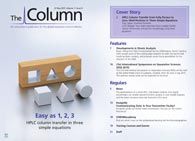21st International Symposium on Separation Sciences (ISSS 2015)
The 21st International Symposium on Separation Sciences (ISSS) will be held at the Grand Hotel Union in Ljubljana, Slovenia, from 30 June–3 July 2015.
The International Symposium on Separation Sciences (ISSS) holds a long and successful tradition of engaging the international community in all areas of separation science. What started out as a biennial meeting of Slovenian and Croatian separation scientists, first held in Slovenia in 1990, has grown into a world-class international event.
The 21st ISSS 2015 will cover new advances and challenges in all fields of separation sciences including electrophoresis; liquid, gas, and thinâlayer chromatography and hyphenated techniques thereof; sample preparation, chemometrics; and validation. The scientific programme will encompass the fundamentals of separation sciences, advances in detection methods, multidimensional techniques, applications, life sciences, metabolomics and biomarker discovery, and natural and synthetic polymers. Separation science has a prominent place in modern analytical chemistry and is globally becoming more and more important in daily life. Several renowned keynote speakers have already agreed to participate: Pat Sandra (Research Institute for Chromatography, Belgium), František Švec (Lawrence Berkeley National Laboratory, California, USA), Peter Schoenmakers (University of Amsterdam, The Netherlands), Colin Poole (Wayne State University, Michigan, USA), BogusÅaw Buszewski (Nicolas Copernicus University, Poland), Danilo Corradini (Institute of Chemical Methodologies, Italy), Attila Felinger (University of Pécs, Hungary), Pavel Jandera (University of Pardubice, Czech Republic), Dušan Berek (Polymer Institute, Slovak Academy of Science, Slovakia), Tomislav Bolanca (University of Zagreb, Croatia), Virginia Coman (BabesâBolyai University, Romania), Imre Klebovich (Semmelweis University, Hungary), Modest Gertsiuk (Institute of Environmental Geochemistry, Ukraine), Doo Soo Chung (Seoul National University, Korea), Mirek Macka (University of Tasmania, Australia), Jeremy Glennon (University College Cork, Ireland), Jaap de Zeeuw (Restek Corporation, The Netherlands), Nika Lendero Krajnc (BIA Separations, Slovenia), Marja-Liisa Riekkola (University of Helsinki, Finland), and Jean-Luc Wolfender (University of Geneva, University of Lausanne, Geneva, Switzerland).
The programme will consist of invited lectures, oral presentations, and poster presentations. All poster presentations will also enter a Best Poster Award competition. The presenting author of the winning poster will be awarded with free participation at the 22nd ISSS 2016. In addition, the Central European Group for Separation Sciences Awards will be presented in recognition of important contributions to the development of separation science. The exhibition will form an integral part of the symposium and will be located in the venue halls. Every year, the vision of ISSS is strongly supported by multiple key sponsors and exhibitors, who are also given an unique opportunity to build trust, enhance credibility, and promote brand awareness and recognition.
The ISSS series has historically been an excellent means for young researchers to expand their knowledge about stateâofâthe-art methods and approaches used in separation sciences. Attractive and rich social programmes will create the perfect atmosphere to connect with old acquaintances and build long-lasting friendships that may blossom into fruitful joint adventures. In the course of the event, the organizers of 21st ISSS 2015 endeavour to inspire future research, innovation, and scientific collaboration as well as offer the participants a taste of Slovenia’s natural beauty, intriguing history, culture, and cuisine.
Chair: Dr. Irena Vovk
E-mail: info@isss2015.si
Website: www.isss2015.si

New TRC Facility Accelerates Innovation and Delivery
April 25th 2025We’ve expanded our capabilities with a state-of-the-art, 200,000 sq ft TRC facility in Toronto, completed in 2024 and staffed by over 100 PhD- and MSc-level scientists. This investment enables the development of more innovative compounds, a broader catalogue and custom offering, and streamlined operations for faster delivery. • Our extensive range of over 100,000 high-quality research chemicals—including APIs, metabolites, and impurities in both native and stable isotope-labelled forms—provides essential tools for uncovering molecular disease mechanisms and exploring new opportunities for therapeutic intervention.
New Guide: Characterising Impurity Standards – What Defines “Good Enough?”
April 25th 2025Impurity reference standards (IRSs) are essential for accurately identifying and quantifying impurities in pharmaceutical development and manufacturing. Yet, with limited regulatory guidance on how much characterisation is truly required for different applications, selecting the right standard can be challenging. To help, LGC has developed a new interactive multimedia guide, packed with expert insights to support your decision-making and give you greater confidence when choosing the right IRS for your specific needs.

.png&w=3840&q=75)

.png&w=3840&q=75)



.png&w=3840&q=75)



.png&w=3840&q=75)









